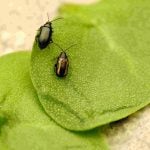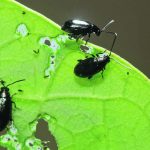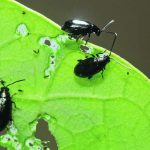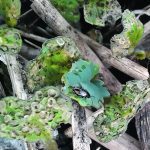A Vancouver agri-tech company wants to give canola growers another weapon in the never-ending battle against flea beetles.
Tag Archives flea beetle

Research looks to control flea beetles with RNAi
A Canadian company hopes to develop an alternative to insecticides when managing the pest in canola crops

Western mustard growers get new flea beetle seed treatment option
Glacier FarmMedia – Canadian mustard growers now have access to a flea beetle control tool that was previously the purview of canola. On Sept. 17, Bayer announced that its Buteo start seed treatment has been registered for mustard in Western Canada. “The damage caused by flea beetles at the start of the season impacts crop […] Read more

Study scrutinizes neonics’ flea beetle mastery
Striped species has always had a natural ability to tolerate neonics, but the insecticide remains effective against crucifers
WINNIPEG — Many generations of flea beetles have been exposed to neonicotinoids in Western Canada over the last two decades. Farmers across the Prairies plant 20 million acres of canola and most of the seeds, year after year, have been coated with neonicotinoid insecticides, commonly known as neonics. From 2017 to 2022, there were many […] Read more
Fight flea beetles at seeding
WINNIPEG — Providing advice on how to successfully grow a crop is much easier than doing it. Keith Gabert, a Canola Council of Canada agronomist in Alberta, is fully aware of that distinction. Related stories: In an ideal world, growers should seed canola about one inch deep into warm, moist soil. Under those conditions, the […] Read more

Consider moisture before spraying flea beetle
“Canola can take a lot of damage before you actually need to spray. The conditions that make me worried for flea beetles though, are the hot and dry conditions because that makes the flea beetle bites on the plants worse. When it’s hot and dry, the plant can’t compensate for having these holes in it and then the holes lead to increased drying,” said Tyler Wist, an Agriculture Canada research scientist who studies flea beetles.





